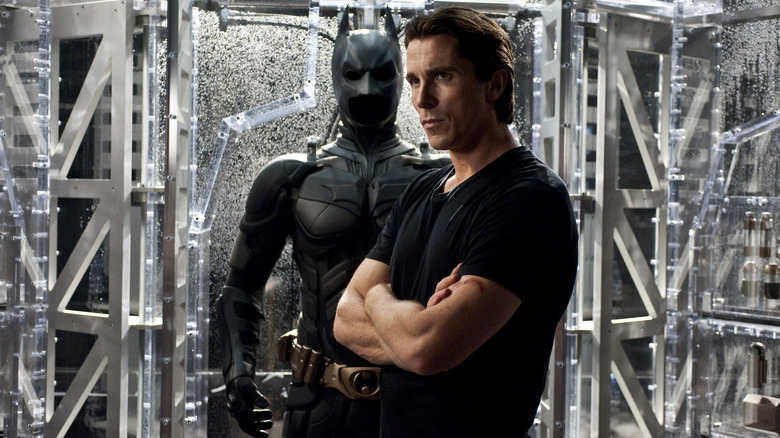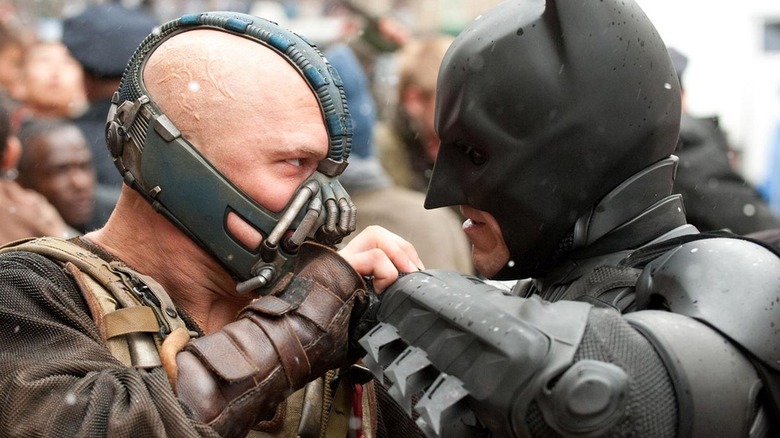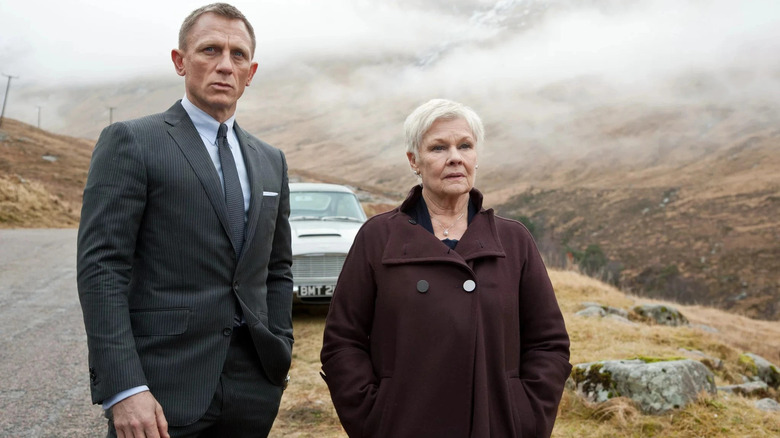Ending The Dark Knight Trilogy At Three Films Helped It Avoid Some James Bond Pitfalls
In case you weren't feeling old enough already, we'd like to remind you that "The Dark Knight Rises" came out over ten years ago. Released a few months after Marvel kicked off its cinematic universe in earnest with "The Avengers," in 2012 it seemed a little disappointing that Nolan's Batman series was ending so soon, after only three movies. Now it seems like a miracle: when was the last time an extremely successful, beloved movie series was simply allowed to end on its own terms? Nolan had zero interest in creating any sort of extended universe with his Batman, and that's a big part of why this trilogy stands above the rest of its genre.
Of course, the MCU wasn't the reason for Christopher Nolan's decision to stick to three films. Instead, the franchise Nolan most wanted to avoid his "Batman" turning into were the James Bond films, which have been going on indefinitely since 1962. Jonathon Nolan, Christopher's brother and co-writer for the latter two "Dark Knight" films explained in a 2020 interview with Empire that they think the Bond franchise struggles from trying to go on indefinitely: "I mean, they've successfully pulled it off with Bond, but at certain costs. Certainly at the cost of continuity."
The Dark Knight's sense of stakes
"I think with almost every other franchise it's a mistake to try and keep those plates spinning. You want stakes," Jonathon Nolan explained further. "You want tectonic plates to shift. And as a writer you wanna feel you've worked on a complete story, with a beginning, a middle and an end."
Sure enough, the "Dark Knight" trilogy has clear stakes that rise naturally with each film without ever fizzling out or growing out of control. As violent and destructive as the villains in "Batman Begins" get, the stakes are surprisingly small in comparison to later films. The main focus is not on whether Gotham will get destroyed, even if that is a major concern. Instead, the movie's focused on the question of whether Bruce will be able to maintain this new role as a masked vigilante, and whether any of this is even worth doing.
"The Dark Knight" takes things up a notch, revolving around a battle for Gotham's soul and a villain who's smarter and more elusive than anyone this Batman's ever faced before. The film also crosses some lines we don't typically expect a superhero movie to cross. Most notably, it kills off the hero's love interest with nearly 50 minutes of runtime to go.
"The Dark Knight Rises" takes things even further, introducing Batman to a villain who is physically stronger than him for the first time in the trilogy. Not only that, but the battle is no longer for Gotham's soul, but for the city's very existence. In any other superhero film, nobody would believe for a second that Batman would die in that explosion at the end, but because we knew this was the final, definitive entry, it felt like a real possibility.
James Bond isn't so different, sometimes
Daniel Craig's tenure as James Bond was heavily inspired by Nolan's take on Batman. Like Nolan with "Batman Begins," the writers of "Casino Royale" wanted to go for a darker, more realistic take on the character. Most people would say they succeeded, at least at first. Beloved characters do die in these movies, and nearly everything that happens has a clear effect on Bond's mental state. Although the Nolans were right that the James Bond franchise as a whole has had a lack of stakes and continuity, Daniel Craig's era is different.
Another similarity between the two series is the way each first entry focuses on the main character's journey to becoming the character we already know and love. Bruce Wayne takes a long time in "Batman Begins" to truly become Batman, just as Bond doesn't get to say his most famous catchphrase until the very end of "Casino Royale."
"What drew me to Batman in the first place was Bruce Wayne's story," said Christopher Nolan. "He's a real character whose story begins in childhood. He's not a fully formed character like James Bond, so what we're doing is we're following the journey of this guy from a child who goes through this horrible experience to becoming this extraordinary character."
That movie came out in 2005, and a year later "Casino Royale" would hit theaters, starting off with a version of James Bond who hadn't yet earned his 007 status. Nolan learned from the problems with the Bond franchise, and the Bond franchise responded by learning from him.


